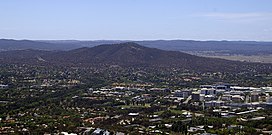Mount Ainslie
| Mount Ainslie | |
|---|---|
 Mount Ainslie viewed from the Telstra Tower | |
| Highest point | |
| Elevation | 843 m (2,766 ft)[1][2] |
| Prominence | 163 m (535 ft)[1] |
| Geography | |
| Location | Australian Capital Territory, Australia |
| Geology | |
| Volcanic arc/belt | Silurian |
| Climbing | |
| Easiest route | Drive |
Mount Ainslie is a hill with an elevation of 843 metres (2,766 ft) AHD [1] that is located in the northeastern suburbs of Canberra, in the Australian Capital Territory, Australia. Mount Ainslie lies within part of the Canberra Nature Park.
Location and features
Mount Ainslie borders on the inner suburbs of Campbell, Ainslie and Hackett and is named in honour of James Ainslie, a 19th-century settler who was the overseer on Duntroon, a large property in the area.[3]

The Mount Ainslie tourist outlook, one of Canberra's most popular,[citation needed] provides excellent views of central Canberra and Red Hill to the south and Black Mountain to the west especially towards sunset. According to an article written in 1922, this outlook 'will afford an ever changing bird's eye and panoramic picture of the city's buildings and beauty spots, as well as of the lovely plains that run to join the Yass Plains on the north.'"The Mercury (Hobart, Tas)". CANBERRA.: ITS EARLY DAYS ROMANCE. HOW MT. AINSLE GOT ITS NAME. 18 October 1922. Retrieved 1 April 2014.Fix An air beacon located at the summit is part of the national capital's air navigation system guiding air traffic towards the nearby Canberra Airport.
A walking trail which leads from the back of the Australian War Memorial is well maintained with steps and is paved, and is often used. The trail has a number of plaques[4] commemorating the battles fought in World War II in the Kokoda Trail in Papua New Guinea, with the plaques set out as though it was on the Kokoda Trail. A quarry is located around 200 metres (660 ft) from the peak.[5]

Mount Ainslie is the northernmost point of a land axis, planned by Walter Burley Griffin,[6] that stretches through North and South Canberra. This axis takes in the Australian War Memorial and the old and new Parliament Houses.
References
- ^ a b c "Mount Ainslie, Australia". Peakbagger.com. Retrieved 22 December 2013.
- ^ The Australian encyclopaedia. Grolier Society of Australia. 1 January 1977. ISBN 978-0-9596604-0-1. Retrieved 26 January 2011.
- ^ White, Harold Leslie (1954). Canberra, a nation's capital : prepared for the thirtieth meeting of the Australian and New Zealand Association for the Advancement of Science, held at Canberra, 13th-20th January 1954. Angus & Robertson. p. 17. Retrieved 26 January 2011.
- ^ Inglis, K. S. (1 April 2008). Sacred Places: War Memorials in the Australian Landscape. The Miegunyah Press. p. 502. ISBN 978-0-522-85479-4. Retrieved 26 January 2011.
- ^ Owen, M. (1987). Geological monuments of the Australian Capital Territory. Australian Heritage Commission. Retrieved 26 January 2011.
- ^ Griffin, Marion Mahony; Watson, Anne Jeanette; Griffin, Walter Burley; Powerhouse Museum (1998). Beyond architecture: Marion Mahony and Walter Burley Griffin : America, Australia, India. University of Illinois Press. p. 91. ISBN 978-1-86317-068-0. Retrieved 26 January 2011.
External links
![]() Media related to Mount Ainslie at Wikimedia Commons
Media related to Mount Ainslie at Wikimedia Commons

